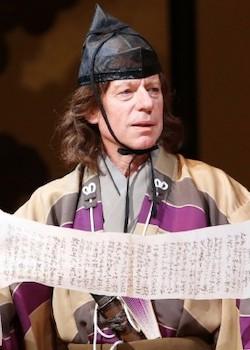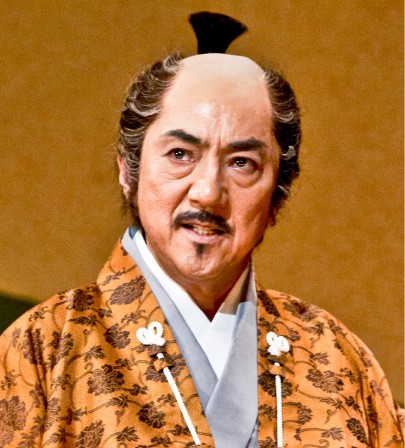Anjin: The Shogun and The English Samurai

By Mike Poulton with Sho Kawai
Sadler’s Wells Theatre
31 January 2013 – 9 February 2013
(Part of the RSC Swan Season, A World Elsewhere)
Review by Michael Sullivan
Click here to see photos from the premiere night performance on Thursday 31 January.
Born in Kent in 1564 William Adams (Muira Anjin 三浦按針) was an English navigator who was employed by the Dutch on an expedition to South America, however should their trading plan fail, they had a backup plan to try for Japan. After a disastrous journey in April 1600 only Adams’ ship out of a fleet of five arrived at Bungo (present day Usuki, Oita Prefecture) with Adams and just a few others able to do much more than stand. Over the next twenty years he would become an important advisor to the shogun, he would be instrumental in helping establish an English trading post and eventually despite having the option is return to Britain he would choose to stay in Japan. In 1620 Adams died in Hirado near Nagasaki where even until today his grave can be seen.
This inspiring play brings his story to life in a production written by Mike Poulton and Shoichiro Kawai, and directed by Gregory Doran (Royal Shakespeare Company’s Artistic Director). It stars veteran actor Masachika Ichimura (市村正親) as the shogun Tokugawa Ieyasu (徳川家康) and Stephen Boxer as Adams. An international supporting cast includes a superb performance by up and coming actor Yuki Furukawa (古川雄輝) as a Japanese Catholic priest who at first is Adams’ translator but becomes his friend despite their differences over religion. The play uses both Japanese and English with subtitles, and this adds to the truly fascinating moments between Adams and the Shogun as they face their differences and similarities. It should also be noted that this is an appropriate time for this play as Britain and Japan mark the 400th anniversary of relations being established between our two countries. In 1613 Adams helped Captain John Saris in his meeting with the shogun and in establishing the English factory in Hirado. The shogun then sent with Captain Saris to Britain two suits of armour as gifts for King James I. These 400 year old suits of Japanese armour can still be seen in the Tower of London today.
As the play opens it is possible to vaguely see a crucified man and a well-covered and bent over figure in Japanese dress, this mysterious scene is left unexplained as they disappear off stage and Catholic Jesuits stride onto the stage. The Portuguese had been present in Japan for some time at this point and this is demonstrated by their use of Japanese and the presence of Yuki Furukawa, training to join the Jesuit order and fluent in European languages. The sighting of a ship in distress prompts the priests to call for rescue, presuming the ship to be from Portugal or Spain. To their consternation the sailors dragged on stage turn out to be Dutch, and one Englishman. As the ship is ransacked the priests tell everyone that these half dead sailors are pirates.
In fear of death at any moment, and at a disadvantage due to his inability to speak Japanese, Adams is selected to represent the crew and to travel to speak to the shogun himself. A troubled Yuki Furukawa perfectly portrays innocence and confusion as he continuously tries to translate honestly Adams’ words while being berated by his Catholic superior and pushed into actions which he finds to be against the teachings of the bible that he so faithfully follows. Meanwhile Stephen Boxer presents us with an Adams who is perhaps a little too full of himself, but who quickly appreciates the beauty of the land he has found himself in.
Although Tokugawa is suspicious of Adams, in particular as his ship had many cannon and because of the words of the Portuguese priest, he finds some merit in what Adams has to say and as we will find out later he has possibly already spotted a possible advantage in keeping Adams around. The meeting is quickly interrupted by news of a rebellion around the son of the last ruler of Japan, it is perhaps here that the play has one of its weakest points as all of the lords in rebellion are introduced, too many to keep track of, and as the battle commences it becomes virtually impossible to follow who is doing what. However, immediately before and also towards the end of the battle it becomes clear one of the uses Tokugawa saw for Adams as he commands him to build a western ship and as Adams supervises the use of cannon which help turn the tide of the war.
The second half of the play sees the years go by and Adams becoming Japanized, he serves as an advisor and translator to Tokugawa, he marries and has children, and finally with the arrival of an English ship he is forced to face the reality of his situation. The English not only bring reminders of how his native people behave but also bring letters from an almost forgotten wife and the miniature portrait of a much loved daughter. Faced with the ability to finally go home he becomes a torn man, his Japanese family’s happiness is threatened, and appalled by Adams’ unchristian decision to abandon his family and return to London, his Jesuit friend loses faith and leaves. Events come to a head as Catholics help forment a new rebellion again around the son of the last ruler while an aging Tokugawa attempts to advise his son, the new shogun, who is disinclined to listen.
The focus of the play is the relationship between Adams and Tokugawa, and despite being from such different worlds they strike up an amazingly close and strong friendship. However, in the background the differences between the West and the East seem to be laden with obstacles as Japanese people are eventually forced to give up their Catholic faith and deceitful Portuguese priests run in fear as they are targeted in the wake of the rebellion. Stephen Boxer finds his moment in the second half as he represents a man at peace in Japan but torn when given the opportunity to return home, he decides to stay, but Japan, and the world, are no longer the same place.

